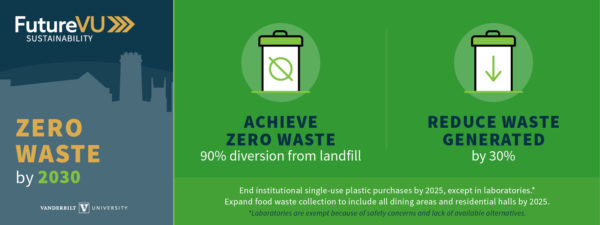
Vanderbilt has announced its commitment to achieving zero waste by the year 2030 as part of the university’s comprehensive long-term strategy to significantly reduce its environmental footprint and drive positive change in the world.
Zero waste is defined as a 90 percent diversion rate from the landfill, acknowledging that no institution is completely waste-free.
Vanderbilt additionally has committed to addressing emissions related to waste disposal and recycling and to making progress toward the university’s carbon neutral and Net Positive + Resilience energy goals by 2050. Vanderbilt is the first premier institution in the Southeast to pursue carbon neutrality and set a Net Zero + Resilience goal for on-campus and purchased power.
Read the full Zero Waste Master Plan here. >>

“Our commitment to carbon neutrality, zero waste and other pressing sustainability efforts are a testament to the cooperation of the entire Vanderbilt community,” said Interim Chancellor and Provost Susan R. Wente. “We have worked together to assess data and establish goals for the future, and we must continue to work together to carry out our vision. As one of the largest employers in Nashville, and a premier institution of higher education, Vanderbilt is setting an example for other large community organizations by how we collaborate across our campus to contribute toward protection of our environment for years to come.”
Administrators, faculty, staff, students and off-campus stakeholders participated in a nine-month, collaborative, research-driven process to address the scopes of the university’s carbon footprint and provide recommendations to reduce the university’s environmental impact as part of FutureVU, the university’s holistic campus planning process.
Vanderbilt’s 30-year history of recycling has expanded in recent years to include food and material waste reduction. The Zero Waste Master Plan continues this forward momentum to attain a higher standard of waste prevention, reduction and reuse This goal also supports Metro Nashville’s zero waste goals that were announced in September 2019.

“This plan embodies the triple bottom line: positive social, environmental and economic impact,” Vice Chancellor for Administration Eric Kopstain said. “Education and research are essential to solving the world’s greatest challenges. We can commit to this goal knowing it is feasible because we remained committed to our mission by carrying out extensive studies and thorough research to establish a vision and plan backed up by data.”
Vanderbilt has already reached a 47 precent diversion rate, but the Zero Waste Master Plan will accelerate the university’s efforts to reach a 90 percent diversion rate over the next decade.
Once the Zero Waste Study was completed, the Zero Waste Advisory Committee outlined two specific goals for the university and two supporting actions:
- Goal 1: Achieve zero waste, a 90 percent diversion rate, by 2030
- Goal 2: Reduce the amount of waste generated on campus by 30 percent by 2030
Supporting Actions:
- End institutional single-use plastic bottle purchases by 2025, except in laboratories*
- Expand food waste collection to include all dining areas and residential halls by 2025
*Laboratories are exempt due to lack of available alternatives and safety concerns.
Several initiatives will be implemented to reach these goals in areas such as food waste collection; recycling and waste infrastructure; material tracking, adaptability and reuse; waste elimination or reduction; sustainable substitutes; purchasing and payment services; education and outreach; and data tracking and reporting. Vanderbilt has made significant strides in these efforts by eliminating single-use plastic water and soda bottles in operations on campus during the fall 2019 semester.
Read specific recommendations to meet the goals in the plan. >>
While new recommendations will be implemented in the coming years, the university will continue to utilize existing approaches to waste, diversion, recycling, food waste collection and reuse. Some of these approaches have included eliminating plastic straws, lids and bags on campus; transitioning to compostable to-go cups, plates and cutlery in dining facilities; increasing hydration stations around dining centers; providing free reusable water bottles to all undergraduate students; enacting new dining processes to lessen food waste; and offering more sustainable printing options.

While the plan features recommendations to be administered by the university, Andrea George, director of sustainability and environmental management, encourages all members of the Vanderbilt community to get involved in zero waste efforts.
“This is a holistic effort among the university’s administration, faculty and students,” George said. “Every member of our community contributes to the overall success of our research and education mission. Reaching this goal is only possible if there is a concerted effort.
“We are looking to change the culture surrounding waste on campus,” she said. “We want Vanderbilt community members to be part of the zero waste efforts because they desire to make a difference in the university’s—and their own—environmental impact.”
For members of the Vanderbilt community interested in joining the efforts to achieve zero waste on campus, the Sustainability and Environmental Management Office shares these easy ways to act:
- Get involved in the FutureVU Sustainability Leaders program to foster a sustainable campus culture
- Replace bottled water with reusable bottles
- Use reusable and compostable dishes and utensils for events, and think about ways to reduce waste from food and packaging
- Reduce waste from meetings by distributing information digitally instead of printing on paper
- Reduce printing waste by using double-sided printing
- Choose more sustainable products when purchasing for offices
- Reduce food waste and collect what is wasted for composting
- Recycle
More tips can be found on the FutureVU Sustainability website.